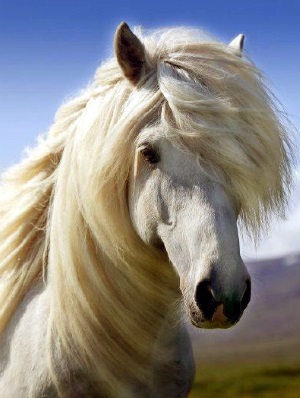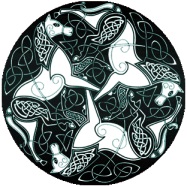Magnificent Horse of the Celtic Gods - ‘Enbarr of the Flowing Mane’

Horses hold a special place in Celtic mythology and there are many examples of where they take on religious significance in Celtic legend. There are few, though, that are as magnificent as the horse known as Enbarr; some alternate name spellings are Aenbharr, Aonbharr and Énbarr. Described as Enbarr of the Flowing Mane, this horse is associated with the great Celtic Sea god Manannán mac Lir. He features in Irish, Scottish and Manx mythology and is Cognate with Manawydan fab Llŷr in Wales. Manannán is closely associated with the Isle of Man (Mannin) and it is from him that the Island derives its name. He is referred to as the first ruler of Mannin and ceremonies continue to be held on the Island in his honour. His role as a god of the Tuatha Dé Danann (Tuatha Dé) is recounted in many Celtic stories.
Stories of the Tuatha Dé have been told through medieval Irish literature which were based on much earlier tales handed down through oral traditions of storytelling. Manannán was known to have been a great magician and was in possession of a number of enchanted items with astounding magical powers. However, there is little to match his magnificent horse Enbarr of the Flowing Mane. This beautiful pure white horse could travel like the wind over land and sea. Manannán lent Enbarr, along with other of his magical possessions to his foster son Lugh, who fought battles for the Tuatha Dé Danann in Ireland. Lugh is an important god of Irish mythology. He was sent to the Isle of Man as a boy to be schooled by Manannán in many skills and to become a great warrior. Manannán had him trained with his own sons in the use of arms, and he learned to hunt and to fish, to run and to swim. He grew tall and strong and brave. However, the time came, with his people the Tuatha Dé engaged in war in Ireland, for him to return home. Important in his quest was his magnificent Enbarr.

Enbarr was very precious to Lugh. In the story Oidheadh Chlainne Tuireann (The Fate of the Children of Tuireann), Lugh refused to loan Enbarr to the sons of Tuireann, but as a result had to lend the self-navigating boat called Sguaba Tuinne. Lugh was a great and important god and hero of Irish mythology and father of the hero Cú Chulainn. He is associated with the harvest festival of Lughnasadh, which is named after him. Lughnasadh is a Gaelic festival marking the beginning of the harvest season. Traditionally held on 1 August, or around halfway between the summer solstice and autumn equinox. It is one of four Gaelic seasonal festivals, along with Samhain, Imbolc and Beltane. Historically, it was widely observed in Ireland, Scotland and the Isle of Man. In Modern Irish it is called Lúnasa, in Scottish Gaelic: Lùnastal, and in Manx: Luanistyn.
Content type:
- Pan-Celtic
Language:
- English






